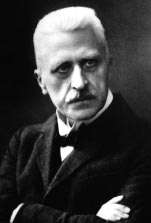Rudolph Otto
(9/25/1869- 3/6/1937)
Rudolf Otto was born on September 25, 1869, in the town of Peine in the Prussian province of Hannover. His father owned a malt factory there. In 1882 the family moved to Hildesheim, and his father died. At the age of twelve Otto entered the Gymnasium Andreanum there. In May, 1888, he enrolled in the school of theology at the University of Erlangen, which was renowned for its conservatism. There he studied with Franz H.R. Frank, Johannes Gloël, and Rudolf Seeberg. For personal reasons, Otto spent a semester at the more liberal school of theology at the University of Gِttingen, where theology had been heavily influenced by the study of history. He returned to Gِttingen for good in the summer semester of 1891. There he studied above all with Hermann Schultz, Theodor von Hنring, and Julius Smend. He passed his first theological examination in 1892 and his second examination in 1895. He awarded the degree of Licentiate of theology, equivalent to a Ph.D., with a dissertation on the Holy Spirit in Luther's thought. After a trial lecture on Kant's conception of religion, he received a license to teach for two years. He was to teach the history of systematic theology and allied fields in the history and philosophy of religion.
Otto spent eight years as an instructor In 1906 he was promoted to associate professor at Gِttingen. Eventually he became a professor of systematic theology, first at Breslau in 1915, then at Marburg in 1917. At Marburg he succeeded the well-known theologian, Wilhelm Hermann. During his time at Gِttingen Otto also participated actively in a group of liberal theologians known as "The Friends ofDie christliche Welt." (Die christliche Welt was a liberal Protestant periodical edited by the practical theologian Martin Rade, who also convened "The Friends.") From 1913 to the end of World War I Otto was a representative in the Prussian state legislature; he was also a member of the Prussian state constitutional convention in 1919. During the Weimar period he sought to renew Protestant worship practices in keeping with his own theological ideas. Also during the Weimar period he founded and led an organization known as the Religiِser Menschheitsbund, "The religious league of humanity." Its goal was to advance right and justice between nations through religious and moral rather than political means. During his career, Otto made two "world tours," as they were called. In 1911-1912 he visited North Africa, South Asia, and East Asia; in 1927-1928 he visited South Asia and the Middle East. These journeys were extremely significant for Otto's interests in other religions besides Christianity, especially Hinduism. In 1924 Otto delivered the Haskell Lectures at Oberlin College, Oberlin, Ohio, on the topic "Mysticism East and West," later published as a
book. In 1926 he gave the Olaus Petri Lectures at the University of Upsala, Sweden, on the topic of another of his mature books: "
India's Religion of Grace and Christianity." Also during this period Otto founded the Religionskundliche Sammlung, Marburg, which is now the site of his archives.
As an adult, Otto was almost always sick. He retired early in March, 1929, on grounds of ill health. Little is known with precision about his thought, aspirations, and activities during the Nazi period. He seems to have hoped for a renewal of German Christianity, but he was not a card-carrying Nazi. In 1936 he fell from a tower at Stauffenberg in the area of Marburg. Scholars are divided on the question of whether this was a suicide attempt. In any case, Otto died of pneumonia contracted during his recuperation on March 6, 1937 in Marburg.
Taken from:
http://www.netrax.net/~galles/